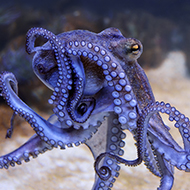
UK will soon recognise animals as sentient beings.
The Animal Welfare (Sentience) Bill passed through the final stages in parliament yesterday (7 April), and will become law, after it has received Royal Assent.
Drafted to replace the animal welfare legislation of the European Union after Brexit, the Bill recognises that animals are sentient and require protection in law.
The Bill, which initially only covered vertebrates, was amended to include decapods and cephalopods – marking the first time that animals such as crabs and lobsters have been recognised as feeling pain in animal welfare law.
Crustacean Compassion, an organisation which has been campaigning for fairer treatment of decapod crustaceans, stated in a post on social media: “As part of our campaign, we joined the #BetterDealForAnimals coalition.
“We’re SO pleased that our combined efforts have resulted in the legal recognition of both decapods and cephalopods as sentient in UK animal welfare legislation.”
The Bill officially passed as Lord Herbert of South Downs removed his amendment to the motion.
In the Consideration of Commons amendments, which took place in the House of Lords yesterday, Lord Herbert of South Downs stated his opposition to the Bill: “When the Bill started, that measure applied only to vertebrates; now it applies to cephalopod molluscs and decapod crustaceans. That was one of the few amendments made to the Bill, and that was by the Government.
“At the height of a pandemic which has killed thousands of people and cost our economy billions, we have decided to devote time to passing a law to ensure that no government policy can hurt the feelings of a prawn.”
Many animal welfare charities and organisations are celebrating the Bill passing its final stages through parliament, including Battersea Cats and Dogs Home, World Horse Welfare, Animal Equality UK, World Animal Protection UK, Wildlife and Countryside Link, Cats Protection and numerous others.
Humane Society International UK posted on social media: "We did it! Parliament just approved the #SentienceBill so it will soon be law!
"This will give animals more of the protection, consideration and compassion they deserve in Parliament. Thank you to our amazing supporters for fighting for this change with us every step of the way!"



 The RCVS has announced a new version of its 1CPD mobile app, with enhanced features for veterinary surgeons and veterinary nurses to record their continuing professional development.
The RCVS has announced a new version of its 1CPD mobile app, with enhanced features for veterinary surgeons and veterinary nurses to record their continuing professional development.